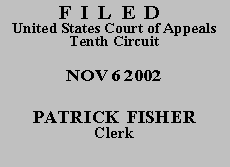

| CHARLES WILLIAM BOOKSTORE,
Petitioner - Appellant, v. MIKE ADDISON, Warden, Respondent - Appellee. |
|
Charles William Bookstore, an Oklahoma state prisoner proceeding pro se, filed a 28 U.S.C. § 2254 petition with the district court, raising seven issues and requesting an evidentiary hearing, appointment of counsel and compulsion of discovery. Adopting the recommendation of the magistrate judge, the district court denied Mr. Bookstore's petition on the merits and denied his requests for an evidentiary hearing, discovery and appointment of counsel. Mr. Bookstore now seeks a certificate of appealability (COA) to permit this court to review the merits of his claims. He also seeks leave to proceed in forma pauperis (IFP). Because he has failed to show that the district court's reasoning was incorrect or even debatable, see Slack v. McDaniel, 529 U.S. 473, 484 (2000), we deny a COA, deny IFP status and dismiss the appeal.
Mr. Bookstore entered an uncounseled guilty plea to the crime of manufacturing methamphetamine and was sentenced to twenty years' imprisonment. He did not file a direct appeal to the state court of appeals, and he did not move timely to withdraw his guilty plea. Seven months later, he obtained an attorney and filed a motion for post-conviction relief, which was denied by the state trial and appellate courts. This pro se § 2254 petition followed.
Mr. Bookstore requests a COA on six of the seven bases he argued to the district court, namely, that (1) procedural bar was used improperly to deny some of his claims, (2) he was not competent to waive counsel and plead guilty, (3) he did not knowingly, intelligently and voluntarily waive his right to counsel, (4) his guilty plea was unknowing, unintelligent and involuntary, (5) a warrantless search of his brother's house and seizure of evidence violated his Fourth Amendment rights, (6) he received ineffective assistance of counsel in his state post-conviction proceedings. He has abandoned on appeal his charge that he was coerced into signing a document. He challenges the district court's orders denying his requests for an evidentiary hearing and appointment of counsel, but he does not appeal the order denying discovery.
We have carefully reviewed Mr. Bookstore's briefs and the record on appeal. We deny issuance of a COA for substantially the same reasons underlying the district court's December 28, 2001 order of dismissal and the magistrate judge's October 2, 2001 report and recommendation. On his claims that procedural bar should not have been invoked, Mr. Bookstore has not met his burden to show that "jurists of reason would find it debatable whether the petition states a valid claim of the denial of a constitutional right and that jurists of reason would find it debatable whether the district court was correct in its procedural ruling." Slack, 529 U.S. at 484. Likewise, Mr. Bookstore has not demonstrated that "reasonable jurists would find the district court's assessment of the constitutional claims debatable or wrong [on the merits]." Id. Accordingly, Mr. Bookstore has not made a "substantial showing of the denial of a constitutional right," and is not entitled to a COA. 28 U.S.C. § 2253(c)(2).
The district court correctly denied Mr. Bookstore's motion for an evidentiary hearing. The state court held a hearing on his post-conviction motion, but Mr. Bookstore maintains that the evidence to support his claims was not developed. Under these circumstances, a federal evidentiary hearing is prohibited unless the petitioner shows that his claims rely on "a new rule of constitutional law ..." or "a factual predicate that could not have been previously discovered through the exercise of due diligence." 28 U.S.C. § 2254(e)(2)(A). Mr. Bookstore does not assert that his claims qualify for a hearing under either § 2254(e)(2)(A) exception. Consequently, he was not entitled to an evidentiary hearing in federal court. Romano v. Gibson, 278 F.3d 1145, 1150 (10th Cir. 2002).
Finally, we affirm the decision not to appoint counsel in this habeas proceeding. Mr. Bookstore's claims are relatively straightforward and the law governing them is settled. "The decision to appoint counsel is left to the sound discretion of the district court, and we see no reason to disturb it in this appeal." Engberg. v. Wyo., 265 F.3d 1109, 1121 (10th Cir. 2001) (citation omitted), cert. denied, 122 S. Ct. 1570 (2002).
The applications for issuance of a COA and IFP status are denied. Appellant is reminded that the full $105.00 filing fee for this appeal is due to the Clerk of the District Court. Appeal DISMISSED. The mandate shall issue forthwith.
Entered for the Court
Circuit Judge
*. This order and judgment is not binding precedent, except under the doctrines of law of the case, res judicata, and collateral estoppel. The court generally disfavors the citation of orders and judgments; nevertheless, an order and judgment may be cited under the terms and conditions of 10th Cir. R. 36.3.